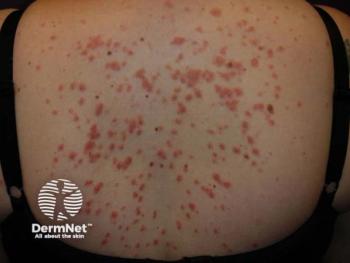
- Dermatology Times, September 2020 (Vol. 41, No. 9)
- Volume 41
- Issue 9
Autoantigen array identifies IgG4 anti-gliadin autoantibody
Key Takeaways
- The IgG4 anti-gliadin autoantibody may serve as a biomarker for psoriasis, aiding in diagnosis and prognosis.
- A novel autoantigen array was developed to identify psoriasis-specific autoantibodies, enhancing disease understanding.
Using a novel autoantigen array, researchers have shown that the IgG4 anti-gliadin autoantibody might provide useful information for diagnosis and prognosis of psoriasis.
Using a novel autoantigen array, researchers have shown that the immunoglobulin G4 (IgG4) anti-gliadin autoantibody might provide useful information for diagnosis and prognosis of psoriasis. The study1 appeared in the March issue of
"We are looking at markers that would predict who gets psoriasis versus who doesn't, and who can be at risk for developing comorbidities," says study co-author Stephen K. Tyring, M.D., Ph.D., M.B.A. He is clinical professor of dermatology, microbiology/molecular genetics and internal medicine at the University of Texas Health Science Center, and medical director of the Center for Clinical Studies in Houston.
Identifying the IgG4 anti-gliadin autoantibody and its potential role in psoriasis required constructing a novel 75-antigen autoantigen array in a project spearheaded by senior author Tianfu Wu, PhD. He is associate professor of biomedical engineering at the University of Houston.
Because there are no commercially available autoantigen arrays for psoriasis, Dr. Wu designed the first psoriasis-specific autoantigen array.
"We have quite a bit of experience in developing autoantibody arrays. After a lot of research into disease mechanisms, we selected potential autoantigens that could be useful for disease-related screening," he says. Researchers printed these autoantigens on a chip and applied serum obtained from Dr. Tyring's clinic.
"And then we could use the detection reagents with fluorescent labels to detect the signals," says Dr. Wu.
Using serum is more practical than cultures or biopsies, which may or may not have predictive value, says Dr. Tyring. Unlike skin biopsies, he adds, patients don't mind having serum taken because starting biologic therapy requires an initial blood draw.
"A little extra tube for serum can predict reproducibly — and maybe in the future, in a commercially available manner — who would respond to which medicine and who would get comorbidities," Dr. Tyring says.
Researchers first performed protein array screening with samples from 12 patients with psoriasis and 12 healthy controls. To validate these findings, the team used ELISA-based methods to confirm that IgG4 anti-gliadin autoantibody levels in an independent cohort of 73 patients with psoriasis were significantly higher than corresponding levels in 75 gender-and age-matched healthy controls, and in 10 patients with atopic dermatitis (AD).
The paper builds upon a June 2019
"The number-one question when you see a psoriasis patient is, should you put this person on a treatment that would prevent their joints from deteriorating as well as helping their skin?" he says.
In psoriasis research, adds Dr. Wu, there is controversy over whether, as a heavily T-cell driven autoimmune disease, psoriasis has a distinct autoantibody basis.
"We designed a relatively comprehensive antigen array to screen for psoriasis-specific antibodies in patient samples,” Dr. Wu says. “We identified two very specific and promising autoantibodies — anti-LL37 and anti-ADAMTSL5 IgG autoantibodies."
Both are elevated in patients with PsA and show correlations with psoriasis activity.
The IgG4 anti-gliadin autoantibody paper went a step further to examine which IgG subtypes (or other autoantibodies) could impact disease activity in psoriasis. Investigators found that IgG4 anti-gliadin autoantibody levels not only could distinguish psoriasis serum from that of healthy controls, but also that levels of this antibody correlated with Psoriasis Area and Severity Index (PASI) scores. Specifically, 42% of patients with psoriasis who had IgG4 anti-gliadin autoantibody levels greater than 0.4 on ELISA had the PASI correlation, coefficient r = 0.65 (P<0.001).
Along with PsA, researchers plan to use the autoantigen array to explore other psoriasis comorbidities such as metabolic syndrome.
Dr. Tyring says, "We've recognized for decades that psoriatic arthritis develops in one-third of patients with psoriasis."
One day, the antigen microarray may allow physicians to intervene in at-risk patients with medication to prevent PsA.
"If we can also predict other comorbidities," says Dr. Tyring, "then we can hopefully work with primary doctors and help patients avoid the cardiovascular and diabetic comorbidities that are also associated with severe psoriasis."
Meanwhile, Drs. Wu and Tyring are exploring some of the same questions in atopic dermatitis, where they have garnered preliminary data.
DISCLOSURE:
Drs. Tyring and Wu report no relevant financial interests.
REFERENCES:
1. Qiu J, Yuan Y, Li Y, et al. Discovery of IgG4 anti-gliadin autoantibody as a potential biomarker of psoriasis using an autoantigen array. Proteomics Clin Appl. 2020;14(2):e1800114. doi:10.1002/prca.201800114.
2. Yuan Y, Qiu J, Lin ZT, et al. Identification of novel autoantibodies associated with psoriatic arthritis. Arthritis Rheumatol. 2019;71(6):941-951.
Articles in this issue
over 5 years ago
Will OSHA cite me for requesting employees not wear masks?over 5 years ago
How safe are cosmetics?over 5 years ago
Pretreatment punch technique guides safe injectionover 5 years ago
What we know (and don’t) about dietary effects on skin agingover 5 years ago
Microbiome-based treatments not ready for prime timeover 5 years ago
Emerging options for high-risk melanomaover 5 years ago
Phenotypes inform management optionsover 5 years ago
AI has potential to improve melanoma detectionNewsletter
Like what you’re reading? Subscribe to Dermatology Times for weekly updates on therapies, innovations, and real-world practice tips.










